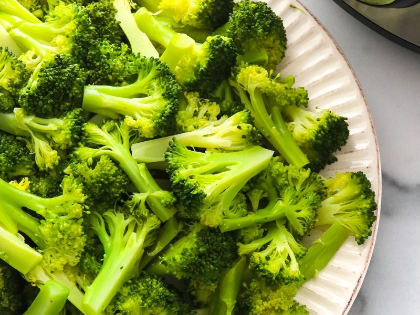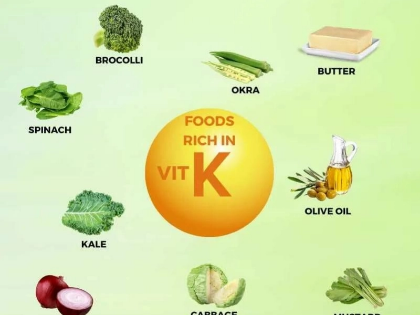Broccoli: A Highly Nutrient Choice for Vegans and Vegetarians
Consuming broccoli, whether it's the leafy Romanesco variety with tiny florets or the huge head and thick stalks of Calabrese, provides you with an abundance of vitamins and minerals. A cup of the vegetable has 93 micrograms of vitamin K, which is necessary for healthy bones and blood coagulation. It also contains fibre, folate, calcium, potassium, and vitamin C.
Rich in Fibre
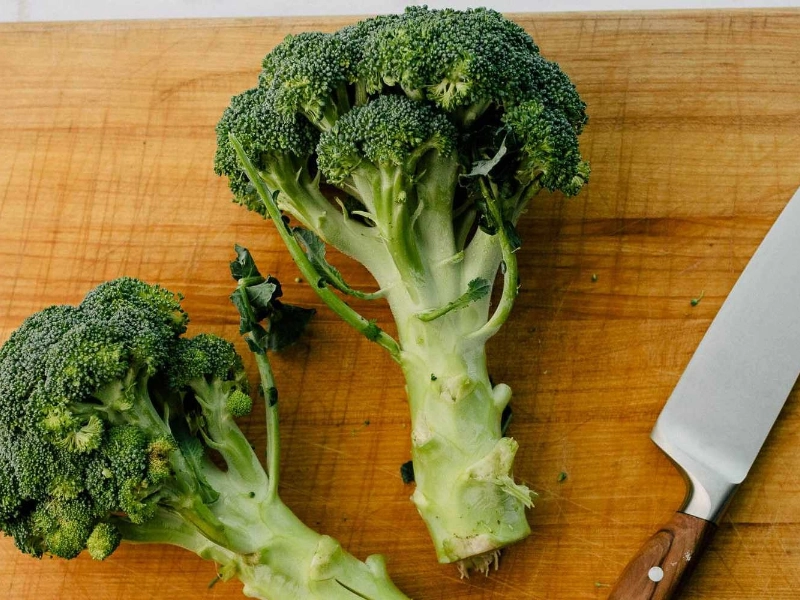
Minimal Calorie Content
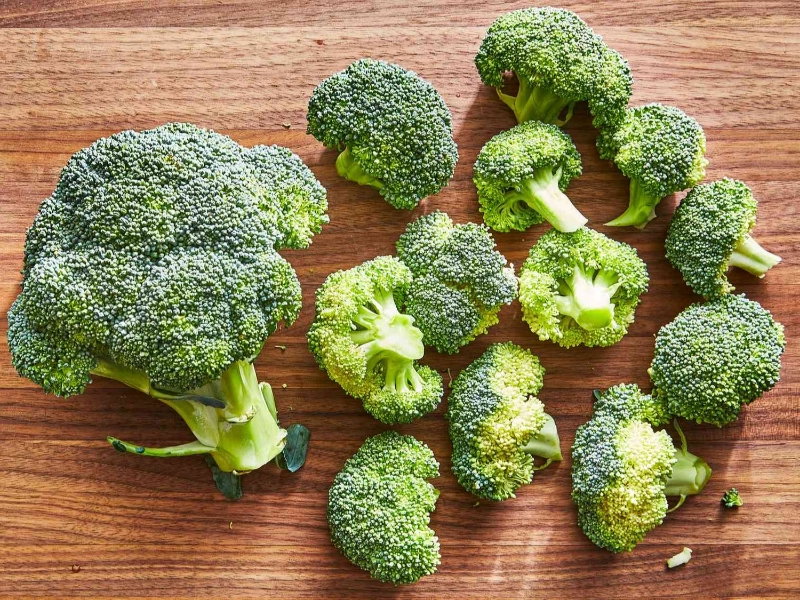 Broccoli (Brassica oleracea var. italica) is a vegetable that belongs to the cruciferous family, which also includes cauliflower, kale, and cabbage. It has phytochemicals that contain sulphur, like sulforaphane and glucosinolates, which the body changes into compounds that fight cancer.
Together with minerals like calcium, potassium, and iron, this green plant also contains vitamins A and C. Its high fibre content facilitates digestion and supports intestinal health. It's high in protein and low in calories.
Broccoli is a great source of folate, which is necessary for healthy coagulation and cell growth, and vitamin C, a micronutrient that doubles as an antioxidant, whether it is added to salads, soups, or stir fries. It also contains a lot of calcium, which supports healthy bones. It is a good source of potassium, which supports heart health and blood pressure regulation. Antioxidants and other plant chemicals that may guard against cancer and chronic inflammation are also abundant in it.
Broccoli (Brassica oleracea var. italica) is a vegetable that belongs to the cruciferous family, which also includes cauliflower, kale, and cabbage. It has phytochemicals that contain sulphur, like sulforaphane and glucosinolates, which the body changes into compounds that fight cancer.
Together with minerals like calcium, potassium, and iron, this green plant also contains vitamins A and C. Its high fibre content facilitates digestion and supports intestinal health. It's high in protein and low in calories.
Broccoli is a great source of folate, which is necessary for healthy coagulation and cell growth, and vitamin C, a micronutrient that doubles as an antioxidant, whether it is added to salads, soups, or stir fries. It also contains a lot of calcium, which supports healthy bones. It is a good source of potassium, which supports heart health and blood pressure regulation. Antioxidants and other plant chemicals that may guard against cancer and chronic inflammation are also abundant in it.
Minimal Fat Content
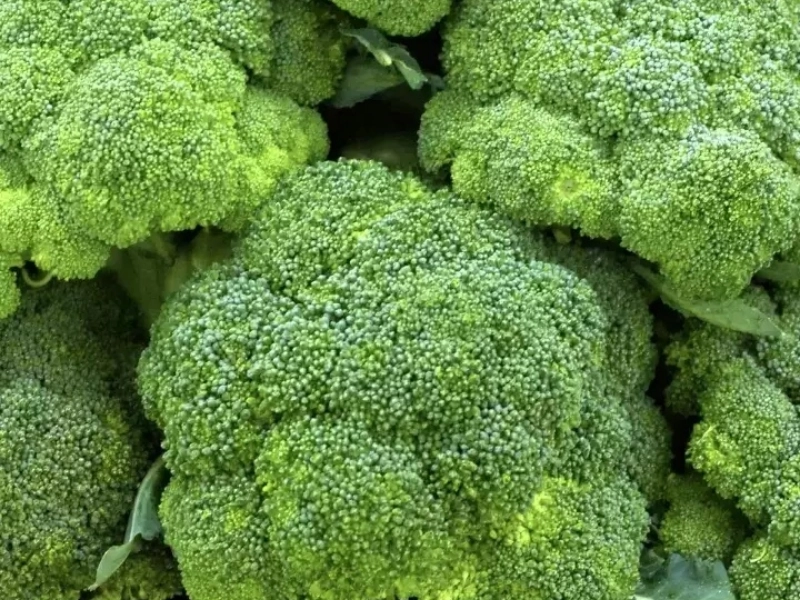 There are a lot of vitamins, minerals, and antioxidants in the cruciferous vegetable that you undoubtedly heard your parents tell you to eat when you were a kid. It contains no fat and little calories. It can be roasted and steamed, or it tastes great in salads.
The greatest thing about broccoli, however, is that it's a potent health enhancer that can assist you in achieving and preserving optimal health. Of all, there are numerous other elements that determine your total well-being, so no single food can ensure optimum health. But broccoli is a great option if you're searching for a cheap, adaptable, and simple-to-prepare healthy vegetable.
The phytochemicals glucoraphanin, gluconasturtiin, and glucobrassicin, which support every stage of the body's detoxification process, are abundant in it. It also contains a lot of folate, potassium, and vitamin C. Moreover, it contains a lot of kaempferol, an antioxidant that helps ward off cancer, heart disease, and other illnesses. (1). Broccoli has an astounding number of carotenoids as well.
There are a lot of vitamins, minerals, and antioxidants in the cruciferous vegetable that you undoubtedly heard your parents tell you to eat when you were a kid. It contains no fat and little calories. It can be roasted and steamed, or it tastes great in salads.
The greatest thing about broccoli, however, is that it's a potent health enhancer that can assist you in achieving and preserving optimal health. Of all, there are numerous other elements that determine your total well-being, so no single food can ensure optimum health. But broccoli is a great option if you're searching for a cheap, adaptable, and simple-to-prepare healthy vegetable.
The phytochemicals glucoraphanin, gluconasturtiin, and glucobrassicin, which support every stage of the body's detoxification process, are abundant in it. It also contains a lot of folate, potassium, and vitamin C. Moreover, it contains a lot of kaempferol, an antioxidant that helps ward off cancer, heart disease, and other illnesses. (1). Broccoli has an astounding number of carotenoids as well.
Rich in Vitamins
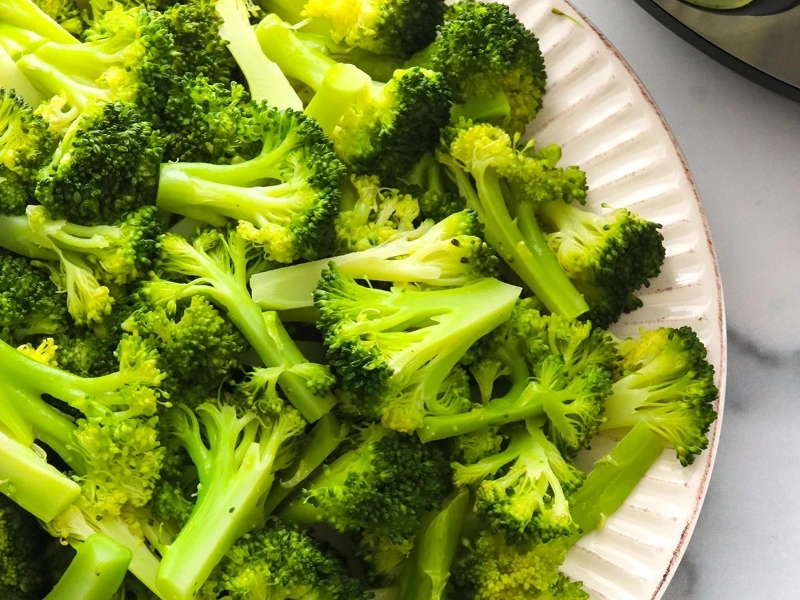 A superfood with a wide range of nutrients is broccoli. 84% of the recommended daily intake (RDI) of vitamin C, which is crucial for immune function and helps prevent and treat some diseases, may be found in just half a cup of cooked broccoli (38). In addition, it has healthy levels of calcium, iron, zinc, potassium, folate, and vitamins E and K. Broccoli also contains lutein and zeaxanthin, two antioxidants that guard your eyes from ageing-related ailments, including cataracts and macular degeneration. These carotenoids also lessen oxidative stress and cellular damage and aid in the absorption and processing of cholesterol by your body (39).
For optimal nutritional value, broccoli should always be consumed raw or very minimally cooked. It is a fantastic supplement to a balanced diet for weight loss because it is low in fat. Broccoli is strong in vitamin K, which can alter the way your medication works if you use blood thinners, so watch how much of it you eat (40). Try combining it with other cruciferous veggies like cauliflower, bok choy, turnips, cabbage, kale, and daikon for even more health benefits.
A superfood with a wide range of nutrients is broccoli. 84% of the recommended daily intake (RDI) of vitamin C, which is crucial for immune function and helps prevent and treat some diseases, may be found in just half a cup of cooked broccoli (38). In addition, it has healthy levels of calcium, iron, zinc, potassium, folate, and vitamins E and K. Broccoli also contains lutein and zeaxanthin, two antioxidants that guard your eyes from ageing-related ailments, including cataracts and macular degeneration. These carotenoids also lessen oxidative stress and cellular damage and aid in the absorption and processing of cholesterol by your body (39).
For optimal nutritional value, broccoli should always be consumed raw or very minimally cooked. It is a fantastic supplement to a balanced diet for weight loss because it is low in fat. Broccoli is strong in vitamin K, which can alter the way your medication works if you use blood thinners, so watch how much of it you eat (40). Try combining it with other cruciferous veggies like cauliflower, bok choy, turnips, cabbage, kale, and daikon for even more health benefits.


